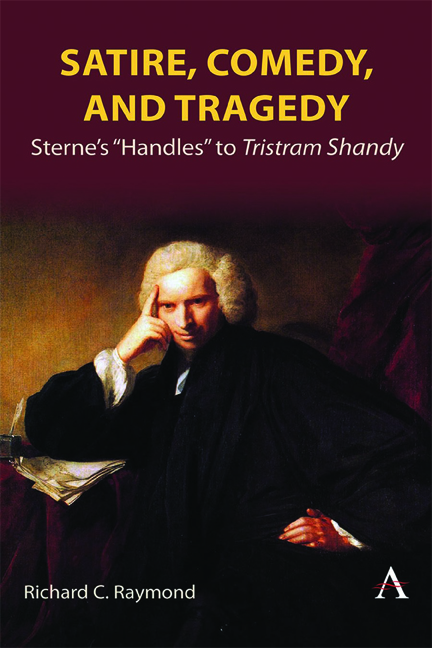Book contents
- Frontmatter
- Contents
- Preface
- 1 Walter, Toby, Tristram, and the Reader: Sterne’s Revision of “Dullness”
- 2 The Yorick Standard, Walter’s Benevolent Dullness, and Tristram’s Friends: The Plot of Satire in Tristram Shandy
- 3 “True Shandeism”: The Unhappy Comic Action in Tristram Shandy
- 4 Isolation and Death: The Tragic Undertones of Shandean Benevolent Dullness
- 5 Benevolent Dullness, Ambiguity, and the Reader: Modal Complexity and the Plots of Tristram Shandy
- 6 Laurence Sterne’s Letters
- 7 The Shandean Sermons of Parson Sterne
- 8 Parson Yorick in A Sentimental Journey and in A Continuation of Bramine’s Journal
- 9 The International Perspective on Tristram Shandy and the Argument
- References
- Index
8 - Parson Yorick in A Sentimental Journey and in A Continuation of Bramine’s Journal
Published online by Cambridge University Press: 01 March 2024
- Frontmatter
- Contents
- Preface
- 1 Walter, Toby, Tristram, and the Reader: Sterne’s Revision of “Dullness”
- 2 The Yorick Standard, Walter’s Benevolent Dullness, and Tristram’s Friends: The Plot of Satire in Tristram Shandy
- 3 “True Shandeism”: The Unhappy Comic Action in Tristram Shandy
- 4 Isolation and Death: The Tragic Undertones of Shandean Benevolent Dullness
- 5 Benevolent Dullness, Ambiguity, and the Reader: Modal Complexity and the Plots of Tristram Shandy
- 6 Laurence Sterne’s Letters
- 7 The Shandean Sermons of Parson Sterne
- 8 Parson Yorick in A Sentimental Journey and in A Continuation of Bramine’s Journal
- 9 The International Perspective on Tristram Shandy and the Argument
- References
- Index
Summary
I have argued in Chapters 1 through 5 that Sterne has consciously revised the traditional action of dullness in Tristram Shandy, that he has created benevolent Shandean characters who frustrate their good intentions with prideful, selfdefeating actions. Forwarding this same argument, Ronald Paulson asserts that Sterne also “modified the satiric process” in writing A Sentimental Journey. Though Yorick functions as a satirist in Tristram Shandy, writes Paulson, in A Sentimental Journey, the traveling parson becomes “both satiric object and observer” (264). To put Paulson's comment in the terminology used above, in A Sentimental Journey, Yorick displays, just like his friends in Tristram Shandy, benevolent dullness. Not surprisingly, in a close reading of Sterne's Continuation of Bramine's Journal, we find this same display of Shandean dullness found in A Sentimental Journey in Sterne's nonfiction account of Yorick-Sterne's passion for Eliza Draper and his anguish in England as she makes her own sentimental journey to India.
A Sentimental Journey
Yorick begins his journey basking in the warmth of his benevolent urge to share his prosperity, but his prejudice toward mendicants quickly exposes his self-righteous dullness. Sounding more like Tristram, who blames all his problems on fortune (1: 8), Yorick claims that he was “predetermined” to put his purse away when the “mild, pale” monk approaches, as the hard-working clergyman, now idle, cannot abide those who get through life in “sloth and ignorance, for the love of God.” Though Yorick later grants charity, in the form of a snuff box, to the monk (1: 26), his sudden, generous reversal, as John Stedmond points out, results from his desire to impress the melancholy beauty he has met. Yet the legitimate warmth of Yorick's heart radiates first from the guilt he suffers for his cruelty to the monk, guilt he feels before he meets the woman (1: 11); later, Yorick will cry over the monk's grave with only the reader there to note his feelings (1: 27).
Yorick's Sentimentality
Yorick's tears, however, do not always flow from deep feeling, as Stedmond argues in discussing the famous caged-starling scenes. Though Yorick sighs apostrophes to the abstraction “Liberty” and laments the “miseries of confinement” suffered in the bird cage and in the Bastille (2: 96, 97), the dull parson, observes Stedmond, forgets to release the bird in his anxiety over his own need for a passport to preserve his freedom (Stedmond 1967, 155; 2: 92).
- Type
- Chapter
- Information
- Satire, Comedy and TragedySterne's 'Handles' to <i>Tristram Shandy</i>, pp. 133 - 140Publisher: Anthem PressPrint publication year: 2023



